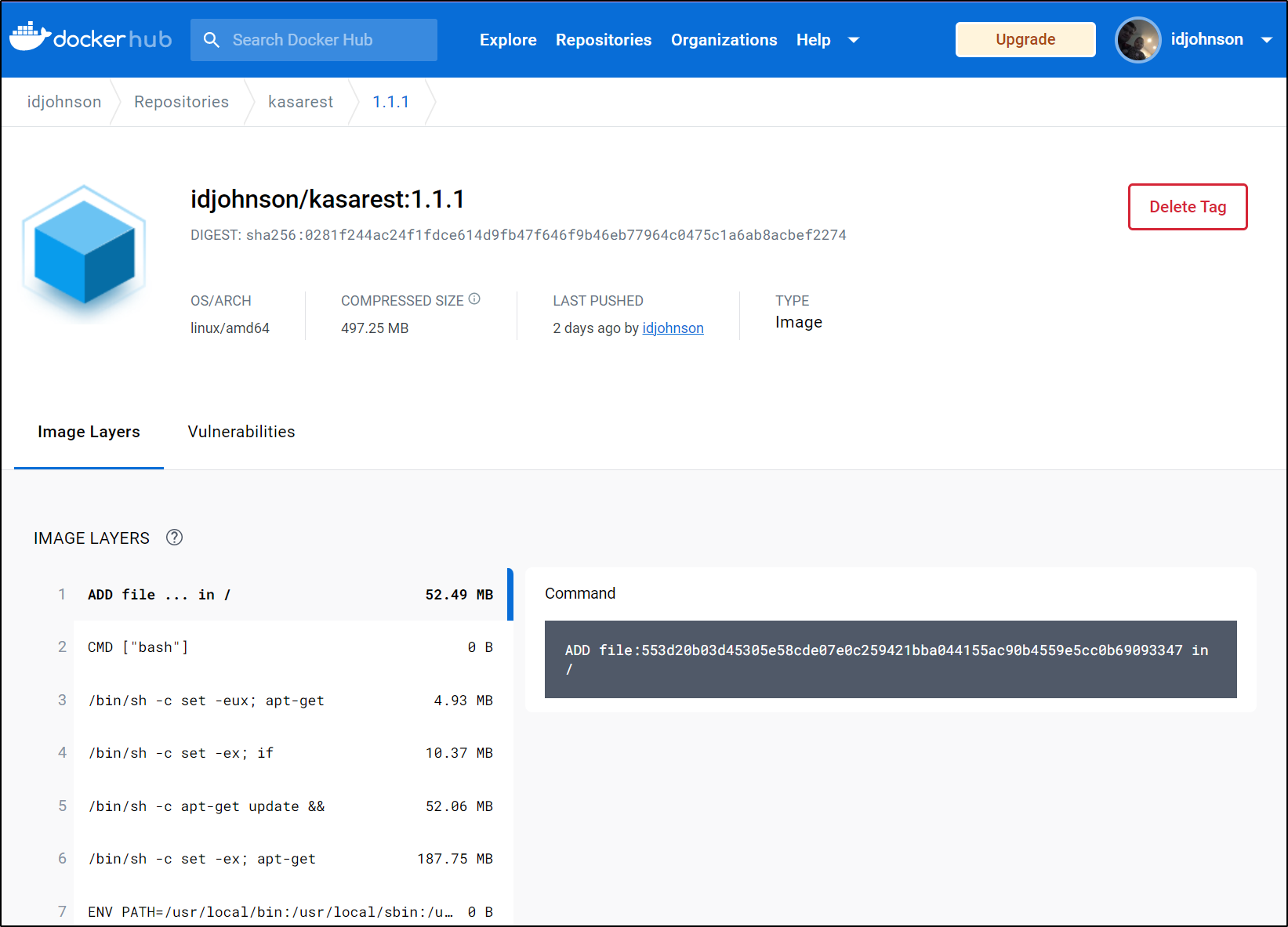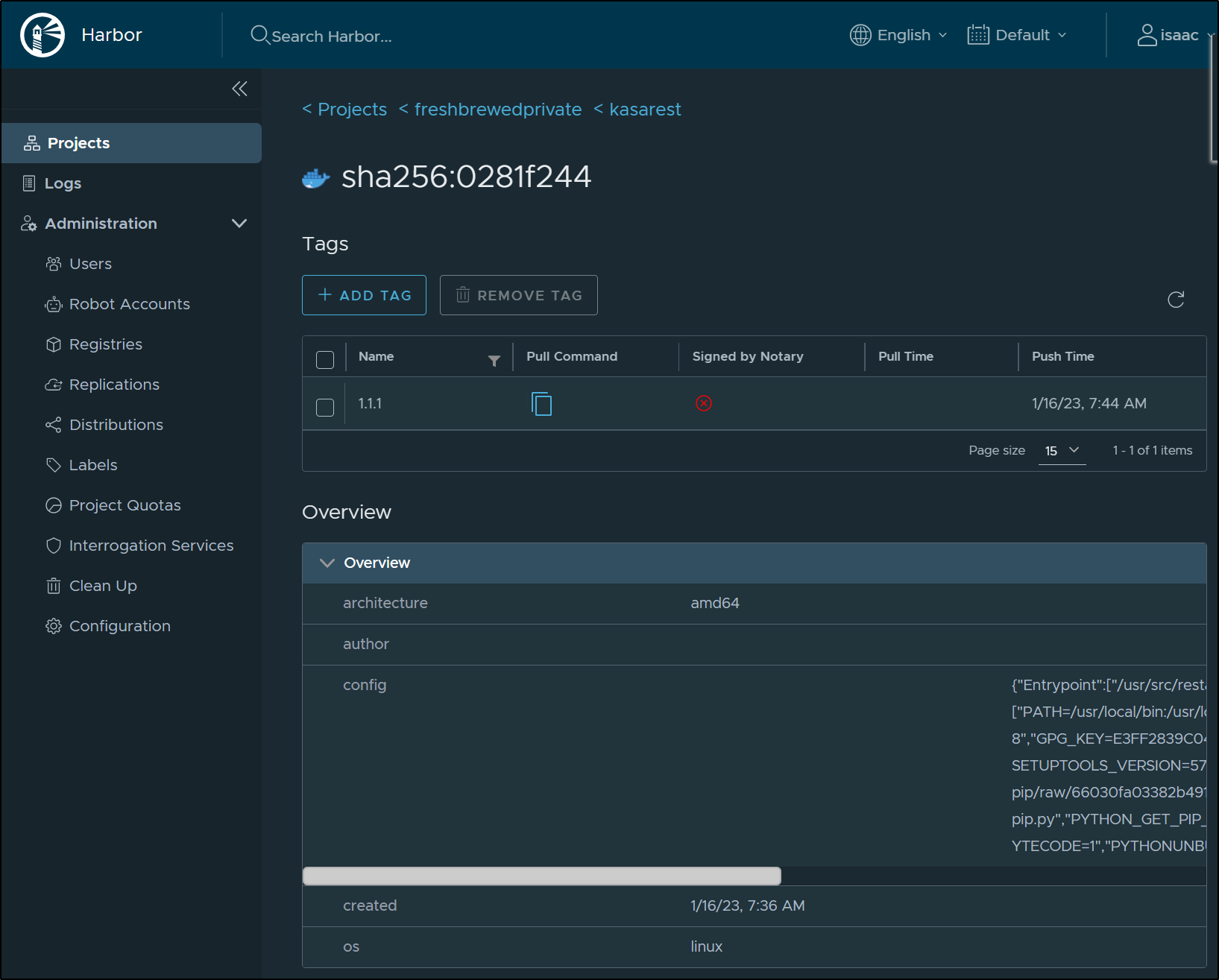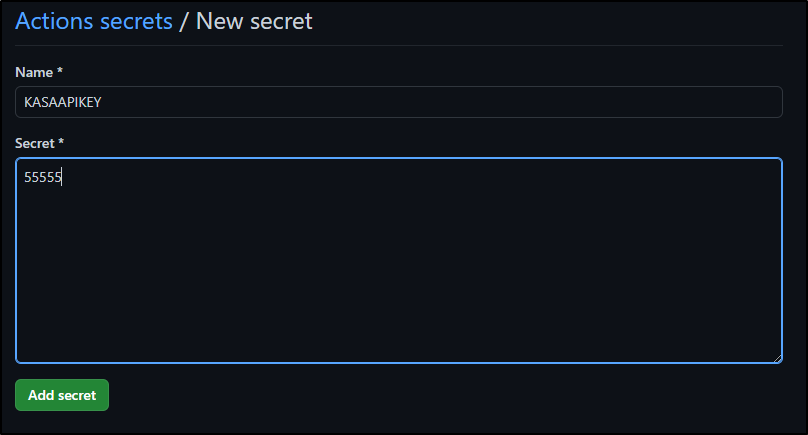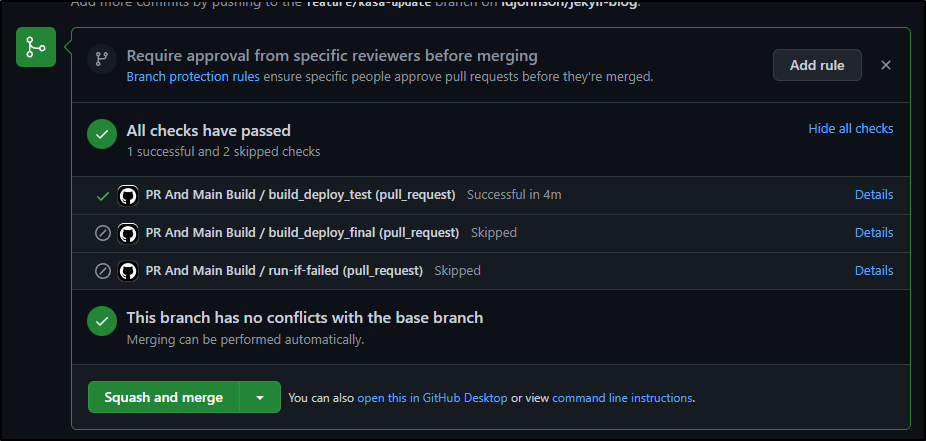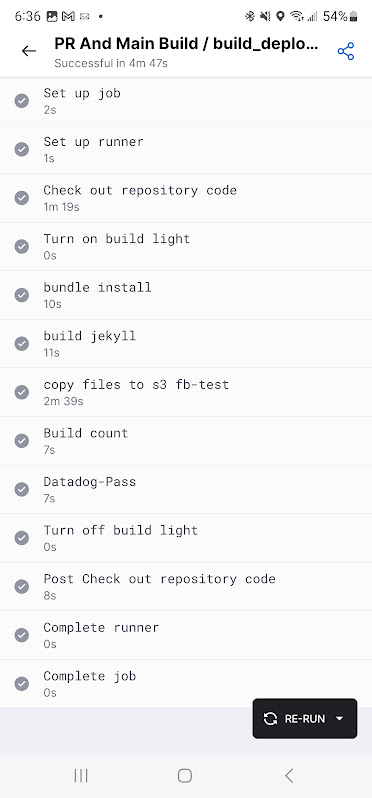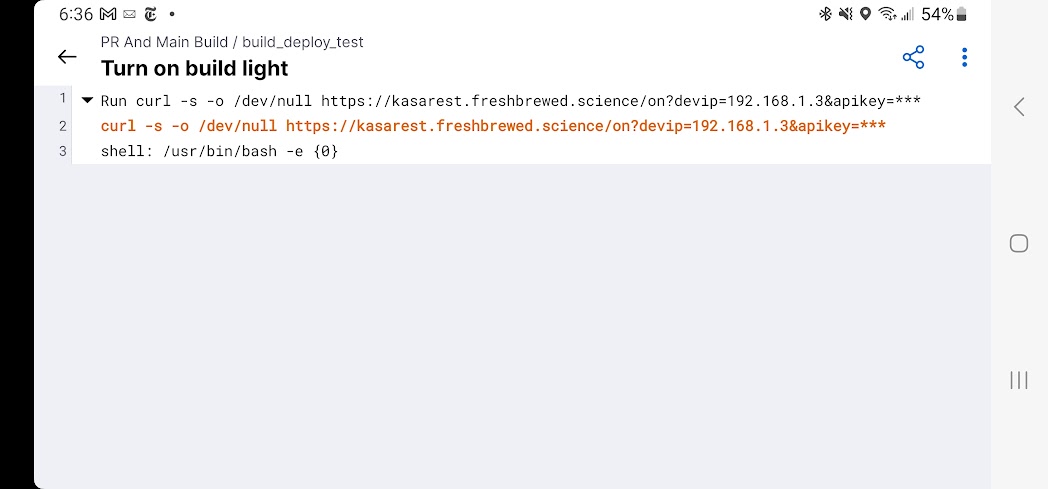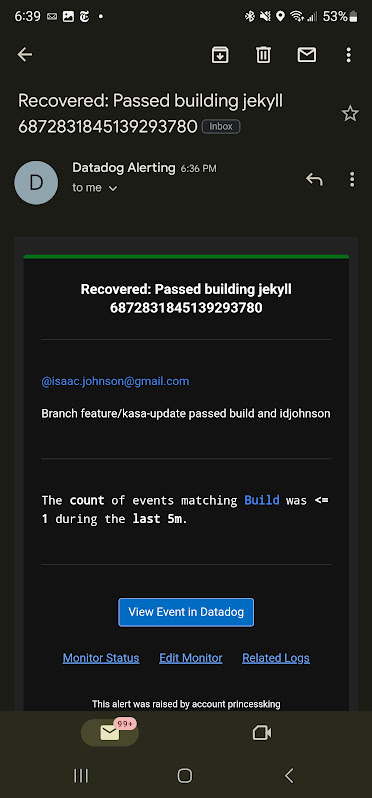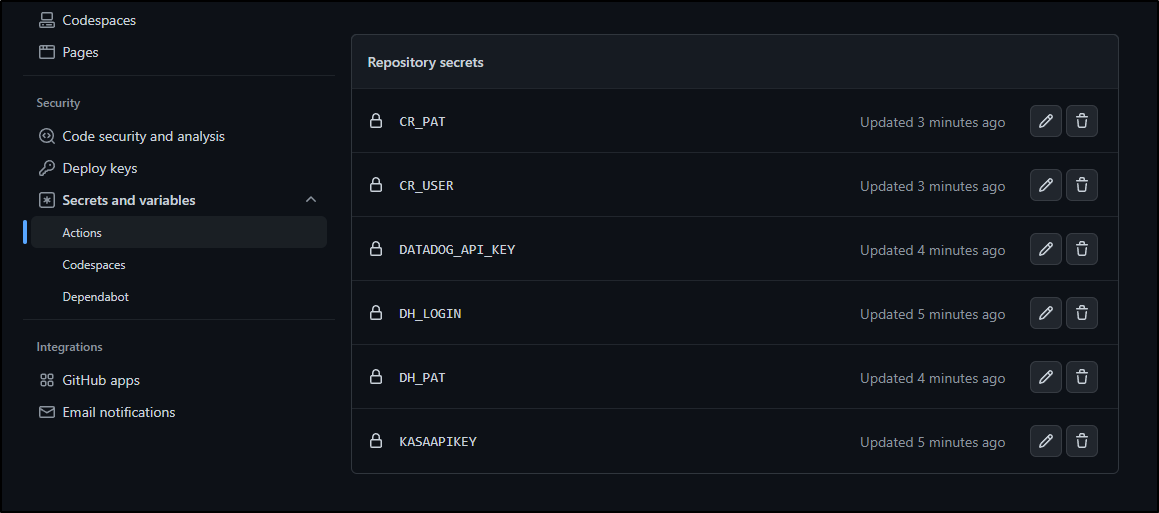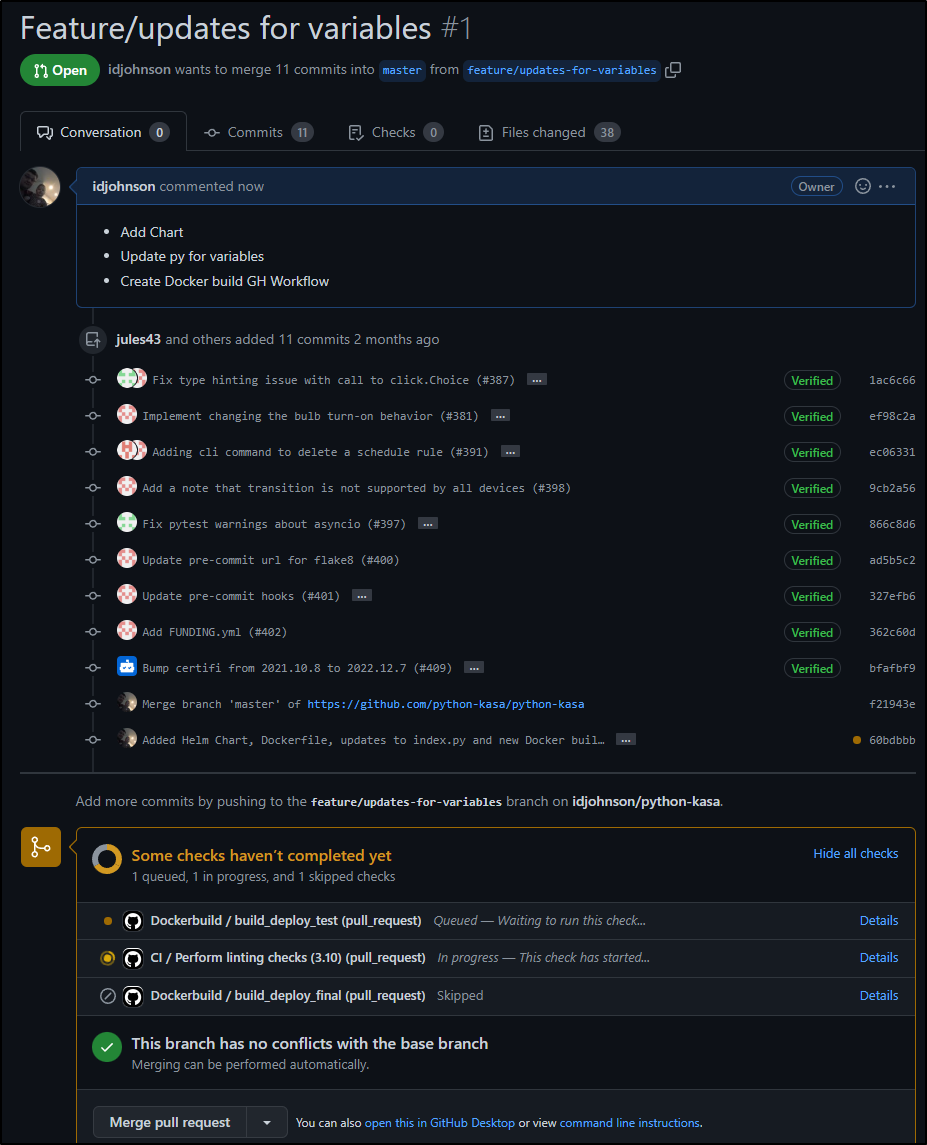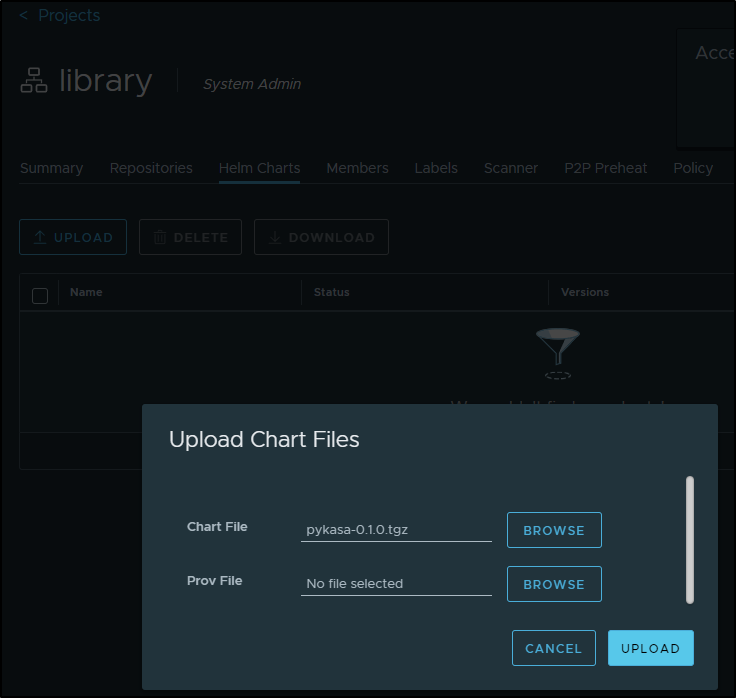Published: Jan 19, 2023 by Isaac Johnson
Back in November, I wrote about Kasa Plugs and PyKasa. In that post I covered how to use Kasa Smart Plugs with lights as webhook triggered indicators. To make the updates, I forked the Python-Kasa repo to here.
The somewhat fun yet also somewhat distracting effect, however, has been that people reading the blog as well as bots have routinely triggered the lights. At first, that was rather fun. But in time, that has become more annoying. Since webhooks are, by their nature, public URLs, we need to create a way to secure them. The common method used by many microservices is to add a KEY or APIKEY.
Today we’ll implement an APIKEY and test. Additionally, we’ll tackle creating a proper helm chart. We’ll create our Github workflow and then set it to upload to both HarborCR and the public Dockerhub. We’ll put a copy of the chart in our HarborCR Public Chart repo (and share the URL). Lastly, we’ll verify everything works by testing both this GH Workflow and others.
Updating my fork
Plenty of updates have happened with Python-Kaska on master. I’ll pull those in to keep the fork up to date.
builder@DESKTOP-QADGF36:~/Workspaces/ijohnson-python-kasa$ git pull https://github.com/python-kasa/python-kasa.git master
remote: Enumerating objects: 55, done.
remote: Counting objects: 100% (55/55), done.
remote: Compressing objects: 100% (26/26), done.
remote: Total 55 (delta 37), reused 37 (delta 28), pack-reused 0
Unpacking objects: 100% (55/55), 38.29 KiB | 956.00 KiB/s, done.
From https://github.com/python-kasa/python-kasa
* branch master -> FETCH_HEAD
Merge made by the 'recursive' strategy.
.github/FUNDING.yml | 1 +
.pre-commit-config.yaml | 14 ++++++------
docs/source/smartbulb.rst | 7 ++++++
kasa/__init__.py | 4 +++-
kasa/cli.py | 47 +++++++++++++++++++++++++++++++++++++++-
kasa/discover.py | 2 +-
kasa/smartbulb.py | 95 ++++++++++++++++++++++++++++++++++++++++++++++++++++++++++++++++++++-------------
kasa/smartdevice.py | 6 ++++--
kasa/smartdimmer.py | 10 +++++----
kasa/smartstrip.py | 10 ++++++---
kasa/tests/conftest.py | 4 ----
kasa/tests/test_bulb.py | 1 -
kasa/tests/test_cli.py | 2 +-
kasa/tests/test_dimmer.py | 2 +-
kasa/tests/test_discovery.py | 2 +-
kasa/tests/test_emeter.py | 2 +-
kasa/tests/test_lightstrip.py | 2 +-
kasa/tests/test_plug.py | 2 +-
kasa/tests/test_protocol.py | 1 -
kasa/tests/test_smartdevice.py | 2 +-
kasa/tests/test_strip.py | 2 +-
poetry.lock | 84 ++++++++++++++++++++++++++++++++++++++---------------------------------
pyproject.toml | 1 +
23 files changed, 216 insertions(+), 87 deletions(-)
create mode 100644 .github/FUNDING.yml
In that last post, I glossed over the Dockerfile build.
The Dockerfile looked as such (Note: I’ve updated the FROM to 3.8.15 from 3.8)
FROM python:3.8.15
#FROM python:3.9
#FROM python:slim
# Keeps Python from generating .pyc files in the container
ENV PYTHONDONTWRITEBYTECODE 1
# Turns off buffering for easier container logging
ENV PYTHONUNBUFFERED 1
# Install and setup poetry
RUN pip install -U pip \
&& apt-get update \
&& apt install -y curl netcat \
&& curl -sSL https://install.python-poetry.org | python3 -
ENV PATH="${PATH}:/root/.local/bin"
WORKDIR /usr/src/app
COPY . .
RUN poetry config virtualenvs.create false \
&& poetry install --no-interaction --no-ansi
RUN pip install Flask
RUN pip install pipenv
# Adding new REST App
WORKDIR /usr/src/restapp
COPY ./cashman-flask-project/some.sh ./cashman-flask-project/swap.sh ./cashman-flask-project/Pipfile ./cashman-flask-project/Pipfile.lock ./cashman-flask-project/bootstrap.sh ./
COPY ./cashman-flask-project/restapi ./restapi
# Install API dependencies
RUN pip install pipenv --upgrade
RUN pipenv lock
RUN pipenv install --system --deploy
# Start app
EXPOSE 5000
ENTRYPOINT ["/usr/src/restapp/bootstrap.sh"]
#harbor.freshbrewed.science/freshbrewedprivate/kasarest:1.1.1
Local Dockerbuild
Before I do anything, I’ll build this Dockerfile and push to Dockerhub and Harbor. In the last post I neglected to push to Dockerhub (which would have been helpful for others)
builder@DESKTOP-QADGF36:~/Workspaces/ijohnson-python-kasa$ docker build -t kasarest:1.1.1 .
[+] Building 69.8s (19/19) FINISHED
=> [internal] load build definition from Dockerfile 0.0s
=> => transferring dockerfile: 1.16kB 0.0s
=> [internal] load .dockerignore 0.0s
=> => transferring context: 34B 0.0s
=> [internal] load metadata for docker.io/library/python:3.8.15 1.9s
=> [auth] library/python:pull token for registry-1.docker.io 0.0s
=> [ 1/13] FROM docker.io/library/python:3.8.15@sha256:7c5b3ec91b7e4131dead176d824ddf317e6c19fe1ae38c54ec0ae60 11.3s
=> => resolve docker.io/library/python:3.8.15@sha256:7c5b3ec91b7e4131dead176d824ddf317e6c19fe1ae38c54ec0ae60389 0.0s
=> => sha256:5c8cfbf51e6e6869f1af2a1e7067b07fd6733036a333c9d29f743b0285e26037 5.16MB / 5.16MB 2.1s
=> => sha256:7c5b3ec91b7e4131dead176d824ddf317e6c19fe1ae38c54ec0ae6038908dd18 1.86kB / 1.86kB 0.0s
=> => sha256:83614f12599b7666292ef828a916d5b9140dc465f4696163022f1cb269f23621 2.22kB / 2.22kB 0.0s
=> => sha256:aa3a609d15798d35c1484072876b7d22a316e98de6a097de33b9dade6a689cd1 10.88MB / 10.88MB 2.5s
=> => sha256:b2477bd071d65d3287eef72698cde4c9025a1817464c5acbaab24fe1d2396330 8.56kB / 8.56kB 0.0s
=> => sha256:f2f58072e9ed1aa1b0143341c5ee83815c00ce47548309fa240155067ab0e698 55.04MB / 55.04MB 1.4s
=> => extracting sha256:f2f58072e9ed1aa1b0143341c5ee83815c00ce47548309fa240155067ab0e698 1.3s
=> => sha256:094e7d9bb04ebf214ea8dc5a488995449684104ae8ad9603bf061cac0d18eb54 54.59MB / 54.59MB 2.4s
=> => sha256:2cbfd734f3824a4390fe4be45f6a11a5543bca1023e4814d72460eaebc2eef89 196.87MB / 196.87MB 5.8s
=> => sha256:22ef46bb37aa091ef97cf92cfac74f1a8d6a244ad3b3d8e30130fb8fef232a30 17.40MB / 17.40MB 6.1s
=> => sha256:aa86ac293d0fa66515f0a670445969ba98dd8d6a114a7f6aea934aaad44084d0 6.29MB / 6.29MB 3.3s
=> => extracting sha256:5c8cfbf51e6e6869f1af2a1e7067b07fd6733036a333c9d29f743b0285e26037 0.2s
=> => extracting sha256:aa3a609d15798d35c1484072876b7d22a316e98de6a097de33b9dade6a689cd1 0.2s
=> => sha256:fe904d2505cb8340337a52df05a7d5e0e0b8eea93d7b05c10f46fc4cb96dfedf 233B / 233B 3.8s
=> => extracting sha256:094e7d9bb04ebf214ea8dc5a488995449684104ae8ad9603bf061cac0d18eb54 1.5s
=> => sha256:a7f0bae21ebb5323b1761346a49e4e8e14381edbd29ea240d48f686cbdd4045d 2.89MB / 2.89MB 4.3s
=> => extracting sha256:2cbfd734f3824a4390fe4be45f6a11a5543bca1023e4814d72460eaebc2eef89 4.0s
=> => extracting sha256:aa86ac293d0fa66515f0a670445969ba98dd8d6a114a7f6aea934aaad44084d0 0.2s
=> => extracting sha256:22ef46bb37aa091ef97cf92cfac74f1a8d6a244ad3b3d8e30130fb8fef232a30 0.5s
=> => extracting sha256:fe904d2505cb8340337a52df05a7d5e0e0b8eea93d7b05c10f46fc4cb96dfedf 0.0s
=> => extracting sha256:a7f0bae21ebb5323b1761346a49e4e8e14381edbd29ea240d48f686cbdd4045d 0.2s
=> [internal] load build context 0.0s
=> => transferring context: 9.02kB 0.0s
=> [ 2/13] RUN pip install -U pip && apt-get update && apt install -y curl netcat && curl -sSL htt 25.3s
=> [ 3/13] WORKDIR /usr/src/app 0.0s
=> [ 4/13] COPY . . 0.0s
=> [ 5/13] RUN poetry config virtualenvs.create false && poetry install --no-interaction --no-ansi 15.0s
=> [ 6/13] RUN pip install Flask 2.5s
=> [ 7/13] RUN pip install pipenv 3.9s
=> [ 8/13] WORKDIR /usr/src/restapp 0.0s
=> [ 9/13] COPY ./cashman-flask-project/some.sh ./cashman-flask-project/swap.sh ./cashman-flask-project/Pipfile 0.0s
=> [10/13] COPY ./cashman-flask-project/restapi ./restapi 0.0s
=> [11/13] RUN pip install pipenv --upgrade 1.5s
=> [12/13] RUN pipenv lock 4.7s
=> [13/13] RUN pipenv install --system --deploy 2.1s
=> exporting to image 0.9s
=> => exporting layers 0.9s
=> => writing image sha256:2b132d635d7c6c86dbbdb7b3f4af82c3a8cb334ef7b4ad408980a44de184f72b 0.0s
=> => naming to docker.io/library/kasarest:1.1.1 0.0s
Now I’ll tag and push to Harbor
$ docker tag kasarest:1.1.1 harbor.freshbrewed.science/freshbrewedprivate/kasarest:1.1.1
$ docker push harbor.freshbrewed.science/freshbrewedprivate/kasarest:1.1.1
The push refers to repository [harbor.freshbrewed.science/freshbrewedprivate/kasarest]
2b15466fba1b: Pushed
3b53e8dcf622: Pushed
d43b23c7131c: Pushed
1a4317c22999: Pushed
9746097ca417: Pushed
97f9013c1d29: Pushed
77a0e6e0f356: Pushed
6e17c2aea757: Pushed
71084fd7aea2: Pushing [==================================================>] 126.3MB
71084fd7aea2: Pushed
4f98a41a322e: Pushed
bae1758cc222: Pushing [==================================================>] 132.1MB
bae1758cc222: Pushed
d3c4d115aaf3: Pushed
7607c97b6c3f: Pushed
1cad4dc57058: Pushed
4ff8844d474a: Pushing [==================================================>] 538.3MB
b77487480ddb: Pushing [==================================================>] 156.5MB
b77487480ddb: Pushed
4ff8844d474a: Pushed
870a241bfebd: Pushing [==================================================>] 129.3MB
870a241bfebd: Pushed
1.1.1: digest: sha256:0281f244ac24f1fdce614d9fb47f646f9b46eb77964c0475c1a6ab8acbef2274 size: 4734
And to Dockerhub
builder@DESKTOP-QADGF36:~/Workspaces/ijohnson-python-kasa$ docker push idjohnson/kasarest:1.1.1
The push refers to repository [docker.io/idjohnson/kasarest]
2b15466fba1b: Pushed
3b53e8dcf622: Pushed
d43b23c7131c: Pushed
1a4317c22999: Pushed
9746097ca417: Pushed
97f9013c1d29: Pushed
77a0e6e0f356: Pushed
6e17c2aea757: Pushed
71084fd7aea2: Pushed
a70cee43520e: Pushed
4f98a41a322e: Pushed
bae1758cc222: Pushed
938e6c7fe440: Mounted from library/python
d3c4d115aaf3: Mounted from library/python
7607c97b6c3f: Mounted from library/python
1cad4dc57058: Mounted from library/python
4ff8844d474a: Mounted from library/python
b77487480ddb: Mounted from library/python
cd247c0fb37b: Mounted from library/python
cfdd5c3bd77e: Mounted from library/python
870a241bfebd: Mounted from library/python
1.1.1: digest: sha256:0281f244ac24f1fdce614d9fb47f646f9b46eb77964c0475c1a6ab8acbef2274 size: 4734
We can now see it in Dockerhub
as well in the private Harbor project
Helm Chart
We now have a properly published container. Let’s stop using bland YAML to deploy and instead setup a proper Helm chart.
Create Helm Chart
$ helm create pykasa
Creating pykasa
I’ve updated the Chart a bit, mostly around restartPolicy and ports.
Let’s give it a dry run to see if it is generating right:
builder@DESKTOP-QADGF36:~/Workspaces/ijohnson-python-kasa/pykasa$ helm install --dry-run --debug --generate-name .
install.go:173: [debug] Original chart version: ""
install.go:190: [debug] CHART PATH: /home/builder/Workspaces/ijohnson-python-kasa/pykasa
NAME: chart-1673878451
LAST DEPLOYED: Mon Jan 16 08:14:11 2023
NAMESPACE: default
STATUS: pending-install
REVISION: 1
USER-SUPPLIED VALUES:
{}
COMPUTED VALUES:
affinity: {}
autoscaling:
enabled: false
maxReplicas: 100
minReplicas: 1
targetCPUUtilizationPercentage: 80
fullnameOverride: ""
image:
pullPolicy: IfNotPresent
repository: harbor.freshbrewed.science/freshbrewedprivate/kasarest
tag: 1.1.0
imagePullSecrets:
- name: myharborreg
ingress:
annotations:
cert-manager.io/cluster-issuer: letsencrypt-prod
kubernetes.io/ingress.class: nginx
kubernetes.io/tls-acme: "true"
className: ""
enabled: true
hosts:
- host: kasarest.freshbrewed.science
paths:
- path: /
pathType: ImplementationSpecific
tls:
- hosts:
- kasarest.freshbrewed.science
secretName: kasarest-tls
nameOverride: ""
nodeSelector: {}
podAnnotations: {}
podSecurityContext: {}
replicaCount: 1
resources: {}
restartPolicy: Always
securityContext: {}
service:
port: 5000
type: ClusterIP
serviceAccount:
annotations: {}
create: true
name: ""
tolerations: []
HOOKS:
---
# Source: pykasa/templates/tests/test-connection.yaml
apiVersion: v1
kind: Pod
metadata:
name: "chart-1673878451-pykasa-test-connection"
labels:
helm.sh/chart: pykasa-0.1.0
app.kubernetes.io/name: pykasa
app.kubernetes.io/instance: chart-1673878451
app.kubernetes.io/version: "1.16.0"
app.kubernetes.io/managed-by: Helm
annotations:
"helm.sh/hook": test
spec:
containers:
- name: wget
image: busybox
command: ['wget']
args: ['chart-1673878451-pykasa:5000']
restartPolicy: Never
MANIFEST:
---
# Source: pykasa/templates/serviceaccount.yaml
apiVersion: v1
kind: ServiceAccount
metadata:
name: chart-1673878451-pykasa
labels:
helm.sh/chart: pykasa-0.1.0
app.kubernetes.io/name: pykasa
app.kubernetes.io/instance: chart-1673878451
app.kubernetes.io/version: "1.16.0"
app.kubernetes.io/managed-by: Helm
---
# Source: pykasa/templates/service.yaml
apiVersion: v1
kind: Service
metadata:
name: chart-1673878451-pykasa
labels:
helm.sh/chart: pykasa-0.1.0
app.kubernetes.io/name: pykasa
app.kubernetes.io/instance: chart-1673878451
app.kubernetes.io/version: "1.16.0"
app.kubernetes.io/managed-by: Helm
spec:
type: ClusterIP
ports:
- port: 5000
targetPort: 5000
protocol: TCP
name: http
selector:
app.kubernetes.io/name: pykasa
app.kubernetes.io/instance: chart-1673878451
---
# Source: pykasa/templates/deployment.yaml
apiVersion: apps/v1
kind: Deployment
metadata:
name: chart-1673878451-pykasa
labels:
helm.sh/chart: pykasa-0.1.0
app.kubernetes.io/name: pykasa
app.kubernetes.io/instance: chart-1673878451
app.kubernetes.io/version: "1.16.0"
app.kubernetes.io/managed-by: Helm
spec:
replicas: 1
selector:
matchLabels:
app.kubernetes.io/name: pykasa
app.kubernetes.io/instance: chart-1673878451
template:
metadata:
labels:
app.kubernetes.io/name: pykasa
app.kubernetes.io/instance: chart-1673878451
spec:
imagePullSecrets:
- name: myharborreg
serviceAccountName: chart-1673878451-pykasa
securityContext:
{}
containers:
- name: pykasa
securityContext:
{}
image: "harbor.freshbrewed.science/freshbrewedprivate/kasarest:1.1.0"
imagePullPolicy: IfNotPresent
ports:
- name: http
containerPort: 5000
protocol: TCP
livenessProbe:
httpGet:
path: /
port: http
readinessProbe:
httpGet:
path: /
port: http
env:
- name: PORT
value: "5000"
resources:
{}
restartPolicy: "Always"
---
# Source: pykasa/templates/ingress.yaml
apiVersion: networking.k8s.io/v1
kind: Ingress
metadata:
name: chart-1673878451-pykasa
labels:
helm.sh/chart: pykasa-0.1.0
app.kubernetes.io/name: pykasa
app.kubernetes.io/instance: chart-1673878451
app.kubernetes.io/version: "1.16.0"
app.kubernetes.io/managed-by: Helm
annotations:
cert-manager.io/cluster-issuer: letsencrypt-prod
kubernetes.io/ingress.class: nginx
kubernetes.io/tls-acme: "true"
spec:
tls:
- hosts:
- "kasarest.freshbrewed.science"
secretName: kasarest-tls
rules:
- host: "kasarest.freshbrewed.science"
http:
paths:
- path: /
pathType: ImplementationSpecific
backend:
service:
name: chart-1673878451-pykasa
port:
number: 5000
NOTES:
1. Get the application URL by running these commands:
https://kasarest.freshbrewed.science/
This looks good. Logically, it is the same as our last yaml
---
apiVersion: apps/v1
kind: Deployment
metadata:
labels:
app: kasarest
app.kubernetes.io/name: kasarest
name: kasarest-deployment
spec:
replicas: 1
selector:
matchLabels:
app: kasarest
strategy:
rollingUpdate:
maxSurge: 25%
maxUnavailable: 25%
type: RollingUpdate
template:
metadata:
labels:
app: kasarest
app.kubernetes.io/name: kasarest
spec:
containers:
- env:
- name: PORT
value: "5000"
image: harbor.freshbrewed.science/freshbrewedprivate/kasarest:1.1.0
name: kasarest
ports:
- containerPort: 5000
protocol: TCP
imagePullSecrets:
- name: myharborreg
restartPolicy: Always
---
apiVersion: v1
kind: Service
metadata:
labels:
app.kubernetes.io/name: kasarest
name: kasarest
spec:
internalTrafficPolicy: Cluster
ports:
- name: http
port: 5000
protocol: TCP
targetPort: 5000
selector:
app.kubernetes.io/name: kasarest
sessionAffinity: None
type: ClusterIP
---
apiVersion: networking.k8s.io/v1
kind: Ingress
metadata:
annotations:
cert-manager.io/cluster-issuer: letsencrypt-prod
kubernetes.io/ingress.class: nginx
kubernetes.io/tls-acme: "true"
name: kasarest
spec:
rules:
- host: kasarest.freshbrewed.science
http:
paths:
- backend:
service:
name: kasarest
port:
number: 5000
path: /
pathType: ImplementationSpecific
tls:
- hosts:
- kasarest.freshbrewed.science
secretName: kasarest-tls
---
Just for safety, I’ll backup my existing values, then remove the Deployment, Service and Ingress
$ kubectl get deployment kasarest-deployment -o yaml > bkup-deployment.yaml
$ kubectl get service kasarest -o yaml > bkup-service.yaml
$ kubectl get ingress kasarest -o yaml > bkup-ingress.yaml
$ kubectl delete -f ./kasadep.yaml
deployment.apps "kasarest-deployment" deleted
service "kasarest" deleted
ingress.networking.k8s.io "kasarest" deleted
$ kubectl get pods | grep kasa
kasarest-deployment-85d4cfbc94-ltcg8 1/1 Terminating 0 76d
Now I’ll install with Helm
builder@DESKTOP-QADGF36:~/Workspaces/ijohnson-python-kasa/pykasa$ helm install mykasarelease .
NAME: mykasarelease
LAST DEPLOYED: Mon Jan 16 08:24:30 2023
NAMESPACE: default
STATUS: deployed
REVISION: 1
NOTES:
1. Get the application URL by running these commands:
https://kasarest.freshbrewed.science/
I’ll then show it’s running
builder@DESKTOP-QADGF36:~/Workspaces/ijohnson-python-kasa/pykasa$ kubectl get pods | grep kasa
mykasarelease-pykasa-565d98c9f5-4vjgz 1/1 Running 0 75s
builder@DESKTOP-QADGF36:~/Workspaces/ijohnson-python-kasa/pykasa$ kubectl get svc | grep kasa
mykasarelease-pykasa ClusterIP 10.43.166.131 <none> 5000/TCP
81s
builder@DESKTOP-QADGF36:~/Workspaces/ijohnson-python-kasa/pykasa$ kubectl get ingress | grep kasa
mykasarelease-pykasa <none> kasarest.freshbrewed.science 192.168.1.214,192.168.1.38,192.168.1.57,192.168.1.77 80, 443 87s
And I can see it is working (with the last release)
I’ll then try updating the image to the tag we just created
builder@DESKTOP-QADGF36:~/Workspaces/ijohnson-python-kasa/pykasa$ helm upgrade mykasarelease --set image.tag=1.1.1 .
Release "mykasarelease" has been upgraded. Happy Helming!
NAME: mykasarelease
LAST DEPLOYED: Mon Jan 16 08:28:21 2023
NAMESPACE: default
STATUS: deployed
REVISION: 2
NOTES:
1. Get the application URL by running these commands:
https://kasarest.freshbrewed.science/
And I can see the pods cycle
$ kubectl get pods | grep kasa
mykasarelease-pykasa-565d98c9f5-4vjgz 1/1 Running 0 5m2s
mykasarelease-pykasa-59488b4f8-tbsk4 0/1 ContainerCreating 0 71s
$ kubectl get pods | grep kasa
mykasarelease-pykasa-59488b4f8-tbsk4 1/1 Running 0 2m44s
mykasarelease-pykasa-565d98c9f5-4vjgz 1/1 Terminating 0 6m35s
$ kubectl get pods | grep kasa
mykasarelease-pykasa-59488b4f8-tbsk4 1/1 Running 0 4m15s
And I can see it is working
Updating to use CM
First, I want the index.py to show that it can show and CM or Secret controlled value and one passed in via GET and POST.
import subprocess
import os
from subprocess import Popen, PIPE
from subprocess import check_output
from flask import Flask, request, jsonify
app = Flask(__name__)
@app.route("/")
def hello_world():
return "use /on /off and /swap with ?devip=IP&apikey=APIKEY!"
@app.route("/on", methods=["GET","POST"])
def turn_on():
deploykey = os.getenv('API_KEY')
if request.method == 'GET':
devip = request.args.get('devip','192.168.1.245')
typen = request.args.get('type','plug')
apikey = request.args.get('apikey','apikey')
stdout = check_output(['./some.sh',typen,devip,'on']).decode('utf-8')
return '''<h1>Turning On {}: {} -- {}. {}</h1>'''.format(devip, deploykey, apikey, stdout)
if request.method == 'POST':
devip = request.form.get('devip')
typen = request.form.get('type','plug')
apikey = request.form.get('apikey','apikey')
stdout = check_output(['./some.sh',typen,devip,'on']).decode('utf-8')
return '''<h1>Turning On {}: {} -- {}. {}</h1>'''.format(devip, deploykey, apikey, stdout)
@app.route("/off", methods=["GET","POST"])
def turn_off():
deploykey = os.getenv('API_KEY')
if request.method == 'GET':
devip = request.args.get('devip','192.168.1.245')
typen = request.args.get('type','plug')
apikey = request.args.get('apikey','apikey')
stdout = check_output(['./some.sh',typen,devip,'off']).decode('utf-8')
return '''<h1>Turning Off {}: {} -- {}. {}</h1>'''.format(devip, deploykey, apikey, stdout)
if request.method == 'POST':
devip = request.form.get('devip')
typen = request.form.get('type','plug')
apikey = request.form.get('apikey','apikey')
stdout = check_output(['./some.sh',typen,devip,'off']).decode('utf-8')
return '''<h1>Turning Off {}: {} -- {}. {}</h1>'''.format(devip, deploykey, apikey, stdout)
@app.route("/swap", methods=["GET","POST"])
def turn_swap():
deploykey = os.getenv('API_KEY')
if request.method == 'GET':
devip = request.args.get('devip','192.168.1.245')
typen = request.args.get('type','plug')
apikey = request.args.get('apikey','apikey')
#return '''<h1>Swapping On/Off: {}</h1>'''.format(devip)
stdout = check_output(['./swap.sh',typen,devip]).decode('utf-8')
return stdout
if request.method == 'POST':
devip = request.form.get('devip','192.168.1.245')
typen = request.form.get('type','plug')
apikey = request.form.get('apikey','apikey')
stdout = check_output(['./swap.sh',typen,devip]).decode('utf-8')
return stdout
@app.route("/testshell1")
def testshell():
session = Popen(['./some.sh'], stdout=PIPE, stderr=PIPE)
stdout, stderr = session.communicate()
if stderr:
raise Exception("Error "+str(stderr))
return stdout.decode('utf-8')
@app.route("/testshell2")
def testshell2():
stdout = check_output(['./some.sh','plug','192.168.1.245','on']).decode('utf-8')
return stdout
@app.route("/testshell3")
def testshell3():
stdout = check_output(['/usr/local/bin/kasa','--host','192.168.1.245','off']).decode('utf-8')
return stdout
@app.route("/testshell4")
def testshell4():
stdout = check_output(['/usr/local/bin/kasa','--host','192.168.1.245','on']).decode('utf-8')
return stdout
@app.route('/health')
def health():
return
What has been added above is the “apikey” and “deploykey” variables.
I’ll add a variable to the values
apikey: 55555
For now, I’ll add the env var via the Deployment
env:
- name: PORT
value: "{{ .Values.service.port }}"
- name: API_KEY
value: "{{ .Values.apikey }}"
We can see it in action:
Adding an API Key Check
Now that we know we can compare a mutable variable (apikey via helm) with that passed in by the caller, we can add a check on it.
import subprocess
import os
from subprocess import Popen, PIPE
from subprocess import check_output
from flask import Flask, request, jsonify
app = Flask(__name__)
@app.route("/")
def hello_world():
return "use /on /off and /swap with ?devip=IP&apikey=APIKEY!"
@app.route("/on", methods=["GET","POST"])
def turn_on():
deploykey = os.getenv('API_KEY')
if request.method == 'GET':
devip = request.args.get('devip','192.168.1.245')
typen = request.args.get('type','plug')
apikey = request.args.get('apikey','apikey')
stdout = check_output(['./some.sh',typen,devip,'on']).decode('utf-8')
if apikey == deploykey:
return '''<h1>Turning On {}: {} -=- {}. {}</h1>'''.format(devip, deploykey, apikey, stdout)
else:
return '''<h1>Turning On {}: {} -NE- {}. {}</h1>'''.format(devip, deploykey, apikey, stdout)
if request.method == 'POST':
devip = request.form.get('devip')
typen = request.form.get('type','plug')
apikey = request.form.get('apikey','apikey')
stdout = check_output(['./some.sh',typen,devip,'on']).decode('utf-8')
if apikey == deploykey:
return '''<h1>Turning On {}: {} -=- {}. {}</h1>'''.format(devip, deploykey, apikey, stdout)
else:
return '''<h1>Turning On {}: {} -NE- {}. {}</h1>'''.format(devip, deploykey, apikey, stdout)
@app.route("/off", methods=["GET","POST"])
def turn_off():
deploykey = os.getenv('API_KEY')
if request.method == 'GET':
devip = request.args.get('devip','192.168.1.245')
typen = request.args.get('type','plug')
apikey = request.args.get('apikey','apikey')
stdout = check_output(['./some.sh',typen,devip,'off']).decode('utf-8')
if apikey == deploykey:
return '''<h1>Turning Off {}: {} -=- {}. {}</h1>'''.format(devip, deploykey, apikey, stdout)
else:
return '''<h1>Turning Off {}: {} -NE- {}. {}</h1>'''.format(devip, deploykey, apikey, stdout)
if request.method == 'POST':
devip = request.form.get('devip')
typen = request.form.get('type','plug')
apikey = request.form.get('apikey','apikey')
stdout = check_output(['./some.sh',typen,devip,'off']).decode('utf-8')
if apikey == deploykey:
return '''<h1>Turning Off {}: {} -=- {}. {}</h1>'''.format(devip, deploykey, apikey, stdout)
else:
return '''<h1>Turning Off {}: {} -NE- {}. {}</h1>'''.format(devip, deploykey, apikey, stdout)
@app.route("/swap", methods=["GET","POST"])
def turn_swap():
deploykey = os.getenv('API_KEY')
if request.method == 'GET':
devip = request.args.get('devip','192.168.1.245')
typen = request.args.get('type','plug')
apikey = request.args.get('apikey','apikey')
#return '''<h1>Swapping On/Off: {}</h1>'''.format(devip)
stdout = check_output(['./swap.sh',typen,devip]).decode('utf-8')
return stdout
if request.method == 'POST':
devip = request.form.get('devip','192.168.1.245')
typen = request.form.get('type','plug')
apikey = request.form.get('apikey','apikey')
stdout = check_output(['./swap.sh',typen,devip]).decode('utf-8')
return stdout
@app.route("/testshell1")
def testshell():
session = Popen(['./some.sh'], stdout=PIPE, stderr=PIPE)
stdout, stderr = session.communicate()
if stderr:
raise Exception("Error "+str(stderr))
return stdout.decode('utf-8')
@app.route("/testshell2")
def testshell2():
stdout = check_output(['./some.sh','plug','192.168.1.245','on']).decode('utf-8')
return stdout
@app.route("/testshell3")
def testshell3():
stdout = check_output(['/usr/local/bin/kasa','--host','192.168.1.245','off']).decode('utf-8')
return stdout
@app.route("/testshell4")
def testshell4():
stdout = check_output(['/usr/local/bin/kasa','--host','192.168.1.245','on']).decode('utf-8')
return stdout
@app.route('/health')
def health():
return
I can see a positive (match)
versus not-match
Now, the last change to make is to actually reject non-matching (and clearly not show the API key)
Switching to secret
I’ll add a new secret.yaml to the templates in the chart
apiVersion: v1
kind: Secret
metadata:
name: {{ include "pykasa.fullname" . }}-apikey
labels:
{{- include "pykasa.labels" . | nindent 4 }}
data:
apikey: {{ .Values.apikey | b64enc }}
Then use it in the deployment.yaml
env:
- name: PORT
value: "{{ .Values.service.port }}"
- name: API_KEY
valueFrom:
secretKeyRef:
name: {{ include "pykasa.fullname" . }}-apikey
key: apikey
Note, it doesnt like a bar number (complains about converting from float64). So I changed the value to a string in the values
apikey: "55555"
Lastly, I want to update my index.py to actually stop work if the API is invalid (and clearly not show the secret as that would defeat the purpose)
@app.route("/on", methods=["GET","POST"])
def turn_on():
deploykey = os.getenv('API_KEY')
if request.method == 'GET':
devip = request.args.get('devip','192.168.1.245')
typen = request.args.get('type','plug')
apikey = request.args.get('apikey','apikey')
if apikey == deploykey:
stdout = check_output(['./some.sh',typen,devip,'on']).decode('utf-8')
return '''<h1>Turning On {}: {}</h1>'''.format(devip, stdout)
else:
return '''<h1>NOT Turning On {}: Invalid API Key {}.</h1>'''.format(devip, apikey)
if request.method == 'POST':
devip = request.form.get('devip')
typen = request.form.get('type','plug')
apikey = request.form.get('apikey','apikey')
if apikey == deploykey:
stdout = check_output(['./some.sh',typen,devip,'on']).decode('utf-8')
return '''<h1>Turning On {}: {}</h1>'''.format(devip, stdout)
else:
return '''<h1>NOT Turning On {}: Invalid API Key {}.</h1>'''.format(devip, apikey)
@app.route("/off", methods=["GET","POST"])
def turn_off():
deploykey = os.getenv('API_KEY')
if request.method == 'GET':
devip = request.args.get('devip','192.168.1.245')
typen = request.args.get('type','plug')
apikey = request.args.get('apikey','apikey')
if apikey == deploykey:
stdout = check_output(['./some.sh',typen,devip,'off']).decode('utf-8')
return '''<h1>Turning Off {}: {}</h1>'''.format(devip, stdout)
else:
return '''<h1>NOT Turning Off {}: Invalid API Key {}.</h1>'''.format(devip, apikey)
if request.method == 'POST':
devip = request.form.get('devip')
typen = request.form.get('type','plug')
apikey = request.form.get('apikey','apikey')
if apikey == deploykey:
stdout = check_output(['./some.sh',typen,devip,'off']).decode('utf-8')
return '''<h1>Turning Off {}: {}</h1>'''.format(devip, stdout)
else:
return '''<h1>NOT Turning Off {}: Invalid API KEY {}.</h1>'''.format(devip, apikey)
@app.route("/swap", methods=["GET","POST"])
def turn_swap():
deploykey = os.getenv('API_KEY')
if request.method == 'GET':
devip = request.args.get('devip','192.168.1.245')
typen = request.args.get('type','plug')
apikey = request.args.get('apikey','apikey')
#return '''<h1>Swapping On/Off: {}</h1>'''.format(devip)
if apikey == deploykey:
stdout = check_output(['./swap.sh',typen,devip]).decode('utf-8')
return stdout
else:
return "INVALID API KEY. WILL NOT SWAP"
if request.method == 'POST':
devip = request.form.get('devip','192.168.1.245')
typen = request.form.get('type','plug')
apikey = request.form.get('apikey','apikey')
if apikey == deploykey:
stdout = check_output(['./swap.sh',typen,devip]).decode('utf-8')
return stdout
else:
return "INVALID API KEY. WILL NOT SWAP"
Now using the freshly built container (1.1.5), we can see it fails with the invalid code
But passes with the valid one
Updating GH Webhooks
Let’s first set a secret in a Github repo we wish to use the built light (the one shown above 192.168.1.3).
(Clearly I used a different value, but to illustrate the point, I’ll show 55555).
I’ll then update my GH Build to use it
- name: Turn on build light
run: |
curl -s -o /dev/null https://kasarest.freshbrewed.science/on?devip=192.168.1.3&apikey=$
One bit of funny business I found with values when testing the chart:
If you want to pass a numeric in, you have to wrap it. e.g.
$ helm upgrade mykasarelease --set image.tag=$DVER --set apikey=\"123412341234\" ./pykasa/
or put in a local values file:
$ cat values.yaml
image:
tag: 1.1.5
apikey: "123412341234"
Then use it in an upgrade
$ helm upgrade mykasarelease -f values.yaml ./pykasa/
Release "mykasarelease" has been upgraded. Happy Helming!
NAME: mykasarelease
LAST DEPLOYED: Mon Jan 16 18:12:13 2023
NAMESPACE: default
STATUS: deployed
REVISION: 11
NOTES:
1. Get the application URL by running these commands:
https://kasarest.freshbrewed.science/
Either way, that means your URL would need to wrap it: https://kasarest.freshbrewed.science/off?devip=192.168.1.3&apikey="123412341234"
If I enter a string however
$ cat values.yaml
image:
tag: 1.1.5
apikey: 5555-5555-5555
That will work without quotes
Testing Github
I’ll now test my updated Kasa microservice (using this post I’m writing).
The PR Passes
I can see from the build logs
It passed the new key
While the prior build failed, this one passed and thus Datadog gave me a heads up
Adding Github Build for PyKasa Docker builds
It’s fun to build and push locally, but it rather against the grain for good CICD practice.
To automate the build and push, I created a new Github workflow
$ cat .github/workflows/docker.yml
name: Dockerbuild
on:
push:
branches:
- main
- master
pull_request:
jobs:
build_deploy_test:
runs-on: ubuntu-latest
if: ${{ (github.ref != 'refs/heads/main') && (github.ref != 'refs/heads/master') }}
steps:
- name: Check out repository code
uses: actions/checkout@v2
- name: Turn on build light
run: |
curl -s -o /dev/null "https://kasarest.freshbrewed.science/on?devip=192.168.1.3&apikey=${{ secrets.KASAAPIKEY }}"
- name: Add SHORT_SHA env property with commit short sha
run: echo "SHORT_SHA=`echo ${GITHUB_SHA} | cut -c1-8`" >> $GITHUB_ENV
- name: Build Dockerfile
run: |
export BUILDIMGNAME="`cat Dockerfile | tail -n1 | sed 's/^.*\/\(.*\):.*/\1/g'`"
export
docker build -t $BUILDIMGNAME:${SHORT_SHA} .
docker images
- name: "Harbor: Tag and Push"
run: |
export BUILDIMGNAME="`cat Dockerfile | tail -n1 | sed 's/^.*\/\(.*\):.*/\1/g'`"
export HARBORPRIVCRROOT="`cat Dockerfile | tail -n1 | sed 's/^#\(.*\)\/.*/\1/g'`"
docker tag $BUILDIMGNAME:${SHORT_SHA} $HARBORPRIVCRROOT/$BUILDIMGNAME:${SHORT_SHA}
docker images
echo $CR_PAT | docker login harbor.freshbrewed.science -u $CR_USER --password-stdin
docker push $HARBORPRIVCRROOT/$BUILDIMGNAME:${SHORT_SHA}
env: # Or as an environment variable
CR_PAT: ${{ secrets.CR_PAT }}
CR_USER: ${{ secrets.CR_USER }}
- name: Build count
uses: masci/datadog@v1
with:
api-key: ${{ secrets.DATADOG_API_KEY }}
metrics: |
- type: "count"
name: "pykasa.runs.count"
value: 1.0
host: ${{ github.repository_owner }}
tags:
- "project:${{ github.repository }}"
- "branch:${{ github.head_ref }}"
- name: Turn off build light
run: |
curl -s -o /dev/null "https://kasarest.freshbrewed.science/off?devip=192.168.1.3&apikey=${{ secrets.KASAAPIKEY }}"
build_deploy_final:
runs-on: self-hosted
if: ${{ (github.ref == 'refs/heads/main') || (github.ref == 'refs/heads/master') }}
steps:
- name: Check out repository code
uses: actions/checkout@v2
- name: Turn on build light
run: |
curl -s -o /dev/null "https://kasarest.freshbrewed.science/on?devip=192.168.1.3&apikey=${{ secrets.KASAAPIKEY }}"
- name: Build Dockerfile
run: |
export BUILDIMGTAG="`cat Dockerfile | tail -n1 | sed 's/^.*\///g'`"
docker build -t $BUILDIMGTAG .
docker images
- name: "Harbor: Tag and Push"
run: |
export BUILDIMGTAG="`cat Dockerfile | tail -n1 | sed 's/^.*\///g'`"
export FINALBUILDTAG="`cat Dockerfile | tail -n1 | sed 's/^#//g'`"
docker tag $BUILDIMGTAG $FINALBUILDTAG
docker images
echo $CR_PAT | docker login harbor.freshbrewed.science -u $CR_USER --password-stdin
docker push $FINALBUILDTAG
env: # Or as an environment variable
CR_PAT: ${{ secrets.CR_PAT }}
CR_USER: ${{ secrets.CR_USER }}
- name: "Dockerhub: Tag and Push"
run: |
export BUILDIMGTAG="`cat Dockerfile | tail -n1 | sed 's/^.*\///g'`"
export FINALVERSION="`cat Dockerfile | tail -n1 | sed 's/^.*://g'`"
docker tag $BUILDIMGTAG idjohnson/$BUILDIMGTAG
docker images
docker login -u="$DOCKER_USERNAME" -p="$DOCKER_PASSWORD"
docker push idjohnson/$BUILDIMGTAG
env: # Or as an environment variable
DOCKER_PASSWORD: ${{ secrets.DH_PAT }}
DOCKER_USERNAME: ${{ secrets.DH_LOGIN }}
- name: Build count
uses: masci/datadog@v1
with:
api-key: ${{ secrets.DATADOG_API_KEY }}
metrics: |
- type: "count"
name: "pykasa.runs.count"
value: 1.0
host: ${{ github.repository_owner }}
tags:
- "project:${{ github.repository }}"
- "branch:${{ github.head_ref }}"
- name: Turn off build light
run: |
curl -s -o /dev/null "https://kasarest.freshbrewed.science/off?devip=192.168.1.3&apikey=${{ secrets.KASAAPIKEY }}"
run-if-failed:
runs-on: ubuntu-latest
needs: [build_deploy_test, build_deploy_final]
if: always() && (needs.build_deploy_test.result == 'failure' || needs.build_deploy_final.result == 'failure')
steps:
- name: Blink and Leave On build light
run: |
curl -s -o /dev/null "https://kasarest.freshbrewed.science/off?devip=192.168.1.3&apikey=${{ secrets.KASAAPIKEY }}" && sleep 5 \
&& curl -s -o /dev/null "https://kasarest.freshbrewed.science/on?devip=192.168.1.3&apikey=${{ secrets.KASAAPIKEY }}" && sleep 5 \
&& curl -s -o /dev/null "https://kasarest.freshbrewed.science/off?devip=192.168.1.3&apikey=${{ secrets.KASAAPIKEY }}" && sleep 5 \
&& curl -s -o /dev/null "https://kasarest.freshbrewed.science/on?devip=192.168.1.3&apikey=${{ secrets.KASAAPIKEY }}"
- name: Datadog-Fail
uses: masci/datadog@v1
with:
api-key: ${{ secrets.DATADOG_API_KEY }}
events: |
- title: "Failed building pykasa"
text: "Branch ${{ github.head_ref }} failed to build"
alert_type: "error"
host: ${{ github.repository_owner }}
tags:
- "project:${{ github.repository }}"
- name: Fail count
uses: masci/datadog@v1
with:
api-key: ${{ secrets.DATADOG_API_KEY }}
metrics: |
- type: "count"
name: "pykasa.fails.count"
value: 1.0
host: ${{ github.repository_owner }}
tags:
- "project:${{ github.repository }}"
- "branch:${{ github.head_ref }}"
This needed a few secrets defined
I then created a PR
I can see it pushed to Harbor the short SHA
Uploading a chart for sharing
I’ll create the package and stash it in my Downloads folder in Windows. (Long term I’ll likely add another GH Workflow just for chart changes that will version it and push to Harbor)
builder@DESKTOP-QADGF36:~/Workspaces/ijohnson-python-kasa$ helm package pykasa
Successfully packaged chart and saved it to: /home/builder/Workspaces/ijohnson-python-kasa/pykasa-0.1.0.tgz
builder@DESKTOP-QADGF36:~/Workspaces/ijohnson-python-kasa$ cp pykasa-0.1.0.tgz /mnt/c/Users/isaac/Downloads/
I can then upload in the UI
We can now pull and use it (though you’ll likely want to update the values)
$ helm repo add freshbrewed https://harbor.freshbrewed.science/chartrepo/library
"freshbrewed" has been added to your repositories
$ helm repo update
Hang tight while we grab the latest from your chart repositories...
...Successfully got an update from the "freshbrewed" chart repository
...Successfully got an update from the "myharbor" chart repository
...Successfully got an update from the "kuma" chart repository
...Successfully got an update from the "dapr" chart repository
...Successfully got an update from the "azure-samples" chart repository
...Successfully got an update from the "novum-rgi-helm" chart repository
...Successfully got an update from the "confluentinc" chart repository
...Successfully got an update from the "adwerx" chart repository
...Successfully got an update from the "uptime-kuma" chart repository
...Successfully got an update from the "rhcharts" chart repository
...Successfully got an update from the "sonarqube" chart repository
...Successfully got an update from the "actions-runner-controller" chart repository
...Successfully got an update from the "kubecost" chart repository
...Successfully got an update from the "hashicorp" chart repository
...Successfully got an update from the "sumologic" chart repository
...Successfully got an update from the "epsagon" chart repository
...Successfully got an update from the "lifen-charts" chart repository
...Successfully got an update from the "longhorn" chart repository
...Successfully got an update from the "elastic" chart repository
...Successfully got an update from the "open-telemetry" chart repository
...Successfully got an update from the "nginx-stable" chart repository
...Successfully got an update from the "datadog" chart repository
...Successfully got an update from the "argo-cd" chart repository
...Successfully got an update from the "harbor" chart repository
...Successfully got an update from the "rancher-latest" chart repository
...Successfully got an update from the "incubator" chart repository
...Successfully got an update from the "crossplane-stable" chart repository
...Successfully got an update from the "newrelic" chart repository
...Successfully got an update from the "gitlab" chart repository
...Successfully got an update from the "rook-release" chart repository
...Successfully got an update from the "bitnami" chart repository
Update Complete. ⎈Happy Helming!⎈
Then search to show the charts there
$ helm search repo freshbrewed
NAME CHART VERSION APP VERSION DESCRIPTION
freshbrewed/pykasa 0.1.0 1.16.0 A Helm chart for PyKasa
If you use it, make sure to update some of the values
$ helm show values freshbrewed/pykasa | head -n20
# Default values for pykasa.
# This is a YAML-formatted file.
# Declare variables to be passed into your templates.
replicaCount: 1
image:
repository: harbor.freshbrewed.science/freshbrewedprivate/kasarest
pullPolicy: IfNotPresent
# Overrides the image tag whose default is the chart appVersion.
tag: 1.1.0
apikey: "55555"
imagePullSecrets: [
name: myharborreg
]
nameOverride: ""
fullnameOverride: ""
restartPolicy: Always
For instance, you could use the public build image at dockerhub
You could use:
$ helm install --dry-run --debug --set image.repository=idjohnson/kasarest --set image.tag=1.1.5 --set imag
ePullSecrets=null freshbrewed/pykasa --generate-name
install.go:173: [debug] Original chart version: ""
install.go:190: [debug] CHART PATH: /home/builder/.cache/helm/repository/pykasa-0.1.0.tgz
NAME: pykasa-1673960029
LAST DEPLOYED: Tue Jan 17 06:53:50 2023
NAMESPACE: default
STATUS: pending-install
REVISION: 1
USER-SUPPLIED VALUES:
image:
repository: idjohnson/kasarest
tag: 1.1.5
imagePullSecrets: null
COMPUTED VALUES:
affinity: {}
apikey: "55555"
autoscaling:
enabled: false
maxReplicas: 100
minReplicas: 1
targetCPUUtilizationPercentage: 80
fullnameOverride: ""
image:
pullPolicy: IfNotPresent
repository: idjohnson/kasarest
tag: 1.1.5
ingress:
annotations:
cert-manager.io/cluster-issuer: letsencrypt-prod
kubernetes.io/ingress.class: nginx
kubernetes.io/tls-acme: "true"
className: ""
enabled: true
hosts:
- host: kasarest.freshbrewed.science
paths:
- path: /
pathType: ImplementationSpecific
tls:
- hosts:
- kasarest.freshbrewed.science
secretName: kasarest-tls
nameOverride: ""
nodeSelector: {}
podAnnotations: {}
podSecurityContext: {}
replicaCount: 1
resources: {}
restartPolicy: Always
securityContext: {}
service:
port: 5000
type: ClusterIP
serviceAccount:
annotations: {}
create: true
name: ""
tolerations: []
HOOKS:
---
# Source: pykasa/templates/tests/test-connection.yaml
apiVersion: v1
kind: Pod
metadata:
name: "pykasa-1673960029-test-connection"
labels:
helm.sh/chart: pykasa-0.1.0
app.kubernetes.io/name: pykasa
app.kubernetes.io/instance: pykasa-1673960029
app.kubernetes.io/version: "1.16.0"
app.kubernetes.io/managed-by: Helm
annotations:
"helm.sh/hook": test
spec:
containers:
- name: wget
image: busybox
command: ['wget']
args: ['pykasa-1673960029:5000']
restartPolicy: Never
MANIFEST:
---
# Source: pykasa/templates/serviceaccount.yaml
apiVersion: v1
kind: ServiceAccount
metadata:
name: pykasa-1673960029
labels:
helm.sh/chart: pykasa-0.1.0
app.kubernetes.io/name: pykasa
app.kubernetes.io/instance: pykasa-1673960029
app.kubernetes.io/version: "1.16.0"
app.kubernetes.io/managed-by: Helm
---
# Source: pykasa/templates/secret.yaml
apiVersion: v1
kind: Secret
metadata:
name: pykasa-1673960029-apikey
labels:
helm.sh/chart: pykasa-0.1.0
app.kubernetes.io/name: pykasa
app.kubernetes.io/instance: pykasa-1673960029
app.kubernetes.io/version: "1.16.0"
app.kubernetes.io/managed-by: Helm
data:
apikey: NTU1NTU=
---
# Source: pykasa/templates/service.yaml
apiVersion: v1
kind: Service
metadata:
name: pykasa-1673960029
labels:
helm.sh/chart: pykasa-0.1.0
app.kubernetes.io/name: pykasa
app.kubernetes.io/instance: pykasa-1673960029
app.kubernetes.io/version: "1.16.0"
app.kubernetes.io/managed-by: Helm
spec:
type: ClusterIP
ports:
- port: 5000
targetPort: 5000
protocol: TCP
name: http
selector:
app.kubernetes.io/name: pykasa
app.kubernetes.io/instance: pykasa-1673960029
---
# Source: pykasa/templates/deployment.yaml
apiVersion: apps/v1
kind: Deployment
metadata:
name: pykasa-1673960029
labels:
helm.sh/chart: pykasa-0.1.0
app.kubernetes.io/name: pykasa
app.kubernetes.io/instance: pykasa-1673960029
app.kubernetes.io/version: "1.16.0"
app.kubernetes.io/managed-by: Helm
spec:
replicas: 1
selector:
matchLabels:
app.kubernetes.io/name: pykasa
app.kubernetes.io/instance: pykasa-1673960029
template:
metadata:
labels:
app.kubernetes.io/name: pykasa
app.kubernetes.io/instance: pykasa-1673960029
spec:
serviceAccountName: pykasa-1673960029
securityContext:
{}
containers:
- name: pykasa
securityContext:
{}
image: "idjohnson/kasarest:1.1.5"
imagePullPolicy: IfNotPresent
ports:
- name: http
containerPort: 5000
protocol: TCP
livenessProbe:
httpGet:
path: /
port: http
readinessProbe:
httpGet:
path: /
port: http
env:
- name: PORT
value: "5000"
- name: API_KEY
valueFrom:
secretKeyRef:
name: pykasa-1673960029-apikey
key: apikey
resources:
{}
restartPolicy: "Always"
---
# Source: pykasa/templates/ingress.yaml
apiVersion: networking.k8s.io/v1
kind: Ingress
metadata:
name: pykasa-1673960029
labels:
helm.sh/chart: pykasa-0.1.0
app.kubernetes.io/name: pykasa
app.kubernetes.io/instance: pykasa-1673960029
app.kubernetes.io/version: "1.16.0"
app.kubernetes.io/managed-by: Helm
annotations:
cert-manager.io/cluster-issuer: letsencrypt-prod
kubernetes.io/ingress.class: nginx
kubernetes.io/tls-acme: "true"
spec:
tls:
- hosts:
- "kasarest.freshbrewed.science"
secretName: kasarest-tls
rules:
- host: "kasarest.freshbrewed.science"
http:
paths:
- path: /
pathType: ImplementationSpecific
backend:
service:
name: pykasa-1673960029
port:
number: 5000
NOTES:
1. Get the application URL by running these commands:
https://kasarest.freshbrewed.science/
Summary
In this post we expanded on our first post by adding a proper Github workflow to build and push the Dockerfile. We updated the python code to check for a new API key which we would compare against a new environment variable. We migrated the YAML Deployment to a proper Helm chart that will set the API Key as a Kubernetes secret. Lastly, we tested the full flow in multiple Github workflows.
Later, I’ll want to automatically build the chart and store it and perhaps find a way to contribute all this back to the original project.


